Ethical Theory Analysis: Unethical Practices in Programming
VerifiedAdded on 2023/01/19
|5
|1145
|78
Essay
AI Summary
This essay presents an ethical theory analysis of a case study involving unethical practices in programming. The scenario revolves around a programmer being asked to create a website using copied source code. The analysis explores the ethical implications of this action through the lenses of utilitarianism, deontological ethics, contract theory, and virtue ethics. The essay argues that copying code is unethical under all four theories, as it fails to produce the greatest good, disregards the inherent wrongness of the act, violates contractual obligations, and undermines virtues like honesty and trust. The essay highlights the potential legal and ethical consequences of such actions, emphasizing the importance of ethical decision-making in professional contexts. The essay concludes by reinforcing the significance of adhering to ethical principles in business and programming to ensure fairness, respect, and trust within the industry.
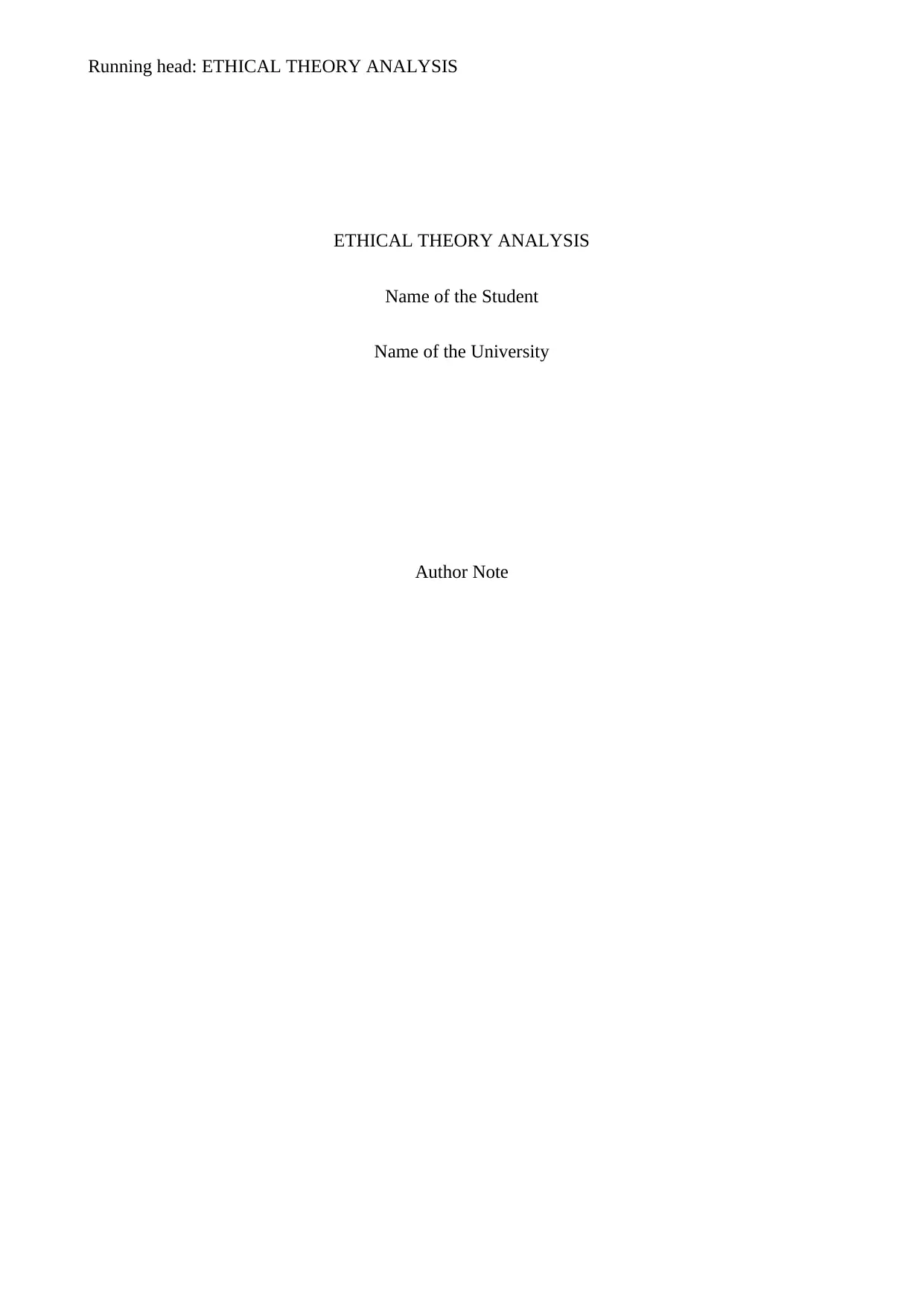
Running head: ETHICAL THEORY ANALYSIS
ETHICAL THEORY ANALYSIS
Name of the Student
Name of the University
Author Note
ETHICAL THEORY ANALYSIS
Name of the Student
Name of the University
Author Note
Paraphrase This Document
Need a fresh take? Get an instant paraphrase of this document with our AI Paraphraser
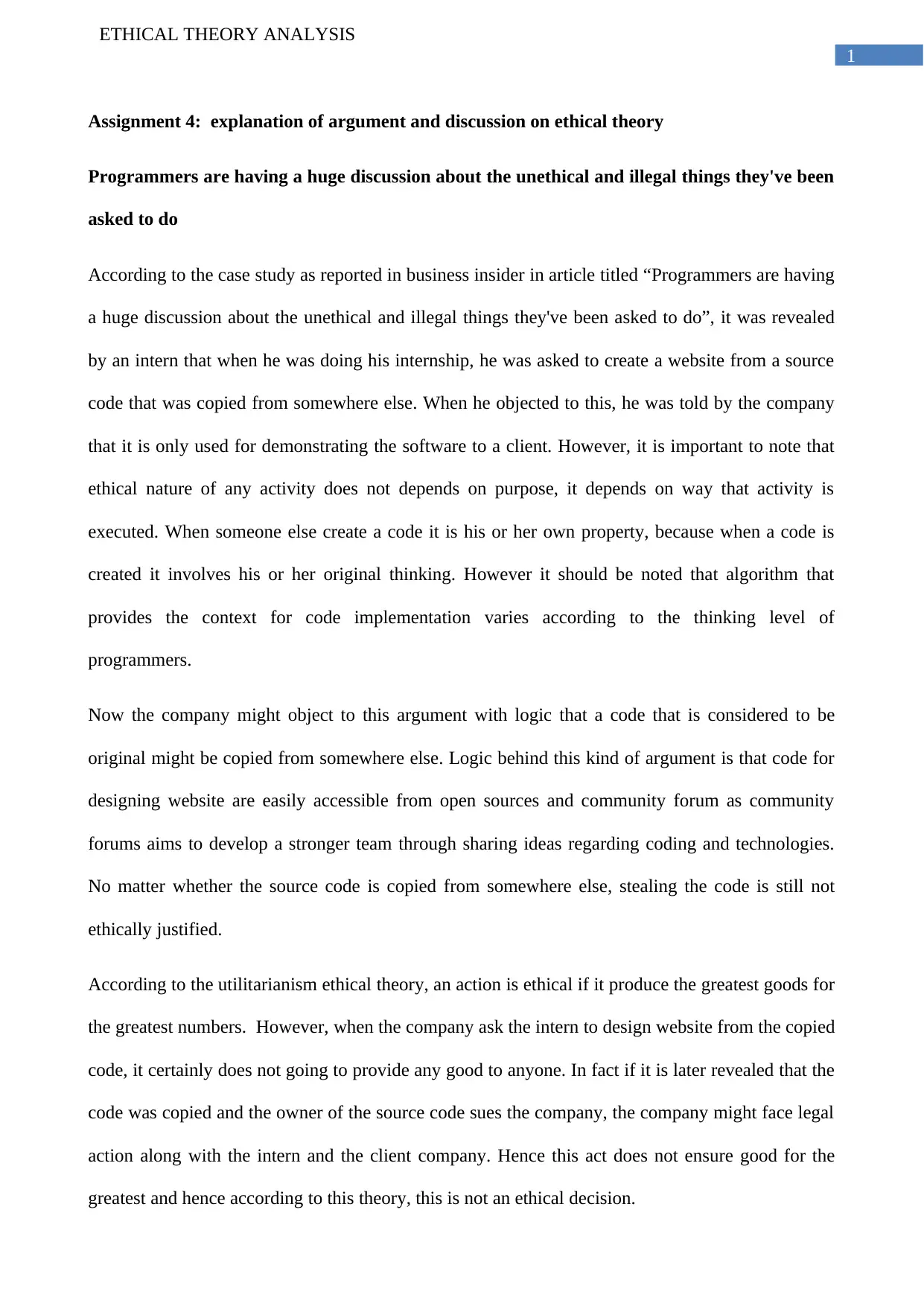
1
ETHICAL THEORY ANALYSIS
Assignment 4: explanation of argument and discussion on ethical theory
Programmers are having a huge discussion about the unethical and illegal things they've been
asked to do
According to the case study as reported in business insider in article titled “Programmers are having
a huge discussion about the unethical and illegal things they've been asked to do”, it was revealed
by an intern that when he was doing his internship, he was asked to create a website from a source
code that was copied from somewhere else. When he objected to this, he was told by the company
that it is only used for demonstrating the software to a client. However, it is important to note that
ethical nature of any activity does not depends on purpose, it depends on way that activity is
executed. When someone else create a code it is his or her own property, because when a code is
created it involves his or her original thinking. However it should be noted that algorithm that
provides the context for code implementation varies according to the thinking level of
programmers.
Now the company might object to this argument with logic that a code that is considered to be
original might be copied from somewhere else. Logic behind this kind of argument is that code for
designing website are easily accessible from open sources and community forum as community
forums aims to develop a stronger team through sharing ideas regarding coding and technologies.
No matter whether the source code is copied from somewhere else, stealing the code is still not
ethically justified.
According to the utilitarianism ethical theory, an action is ethical if it produce the greatest goods for
the greatest numbers. However, when the company ask the intern to design website from the copied
code, it certainly does not going to provide any good to anyone. In fact if it is later revealed that the
code was copied and the owner of the source code sues the company, the company might face legal
action along with the intern and the client company. Hence this act does not ensure good for the
greatest and hence according to this theory, this is not an ethical decision.
ETHICAL THEORY ANALYSIS
Assignment 4: explanation of argument and discussion on ethical theory
Programmers are having a huge discussion about the unethical and illegal things they've been
asked to do
According to the case study as reported in business insider in article titled “Programmers are having
a huge discussion about the unethical and illegal things they've been asked to do”, it was revealed
by an intern that when he was doing his internship, he was asked to create a website from a source
code that was copied from somewhere else. When he objected to this, he was told by the company
that it is only used for demonstrating the software to a client. However, it is important to note that
ethical nature of any activity does not depends on purpose, it depends on way that activity is
executed. When someone else create a code it is his or her own property, because when a code is
created it involves his or her original thinking. However it should be noted that algorithm that
provides the context for code implementation varies according to the thinking level of
programmers.
Now the company might object to this argument with logic that a code that is considered to be
original might be copied from somewhere else. Logic behind this kind of argument is that code for
designing website are easily accessible from open sources and community forum as community
forums aims to develop a stronger team through sharing ideas regarding coding and technologies.
No matter whether the source code is copied from somewhere else, stealing the code is still not
ethically justified.
According to the utilitarianism ethical theory, an action is ethical if it produce the greatest goods for
the greatest numbers. However, when the company ask the intern to design website from the copied
code, it certainly does not going to provide any good to anyone. In fact if it is later revealed that the
code was copied and the owner of the source code sues the company, the company might face legal
action along with the intern and the client company. Hence this act does not ensure good for the
greatest and hence according to this theory, this is not an ethical decision.
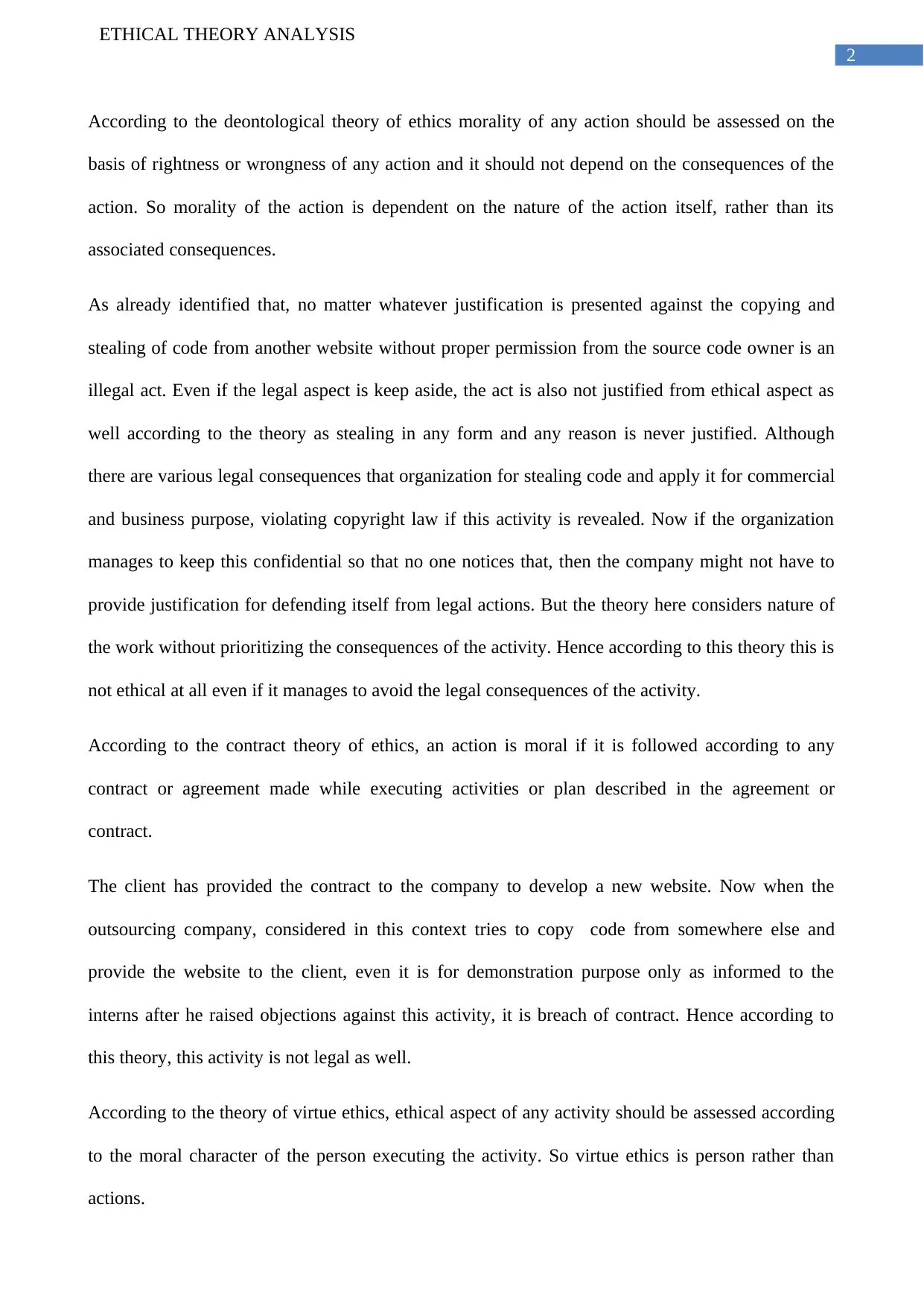
2
ETHICAL THEORY ANALYSIS
According to the deontological theory of ethics morality of any action should be assessed on the
basis of rightness or wrongness of any action and it should not depend on the consequences of the
action. So morality of the action is dependent on the nature of the action itself, rather than its
associated consequences.
As already identified that, no matter whatever justification is presented against the copying and
stealing of code from another website without proper permission from the source code owner is an
illegal act. Even if the legal aspect is keep aside, the act is also not justified from ethical aspect as
well according to the theory as stealing in any form and any reason is never justified. Although
there are various legal consequences that organization for stealing code and apply it for commercial
and business purpose, violating copyright law if this activity is revealed. Now if the organization
manages to keep this confidential so that no one notices that, then the company might not have to
provide justification for defending itself from legal actions. But the theory here considers nature of
the work without prioritizing the consequences of the activity. Hence according to this theory this is
not ethical at all even if it manages to avoid the legal consequences of the activity.
According to the contract theory of ethics, an action is moral if it is followed according to any
contract or agreement made while executing activities or plan described in the agreement or
contract.
The client has provided the contract to the company to develop a new website. Now when the
outsourcing company, considered in this context tries to copy code from somewhere else and
provide the website to the client, even it is for demonstration purpose only as informed to the
interns after he raised objections against this activity, it is breach of contract. Hence according to
this theory, this activity is not legal as well.
According to the theory of virtue ethics, ethical aspect of any activity should be assessed according
to the moral character of the person executing the activity. So virtue ethics is person rather than
actions.
ETHICAL THEORY ANALYSIS
According to the deontological theory of ethics morality of any action should be assessed on the
basis of rightness or wrongness of any action and it should not depend on the consequences of the
action. So morality of the action is dependent on the nature of the action itself, rather than its
associated consequences.
As already identified that, no matter whatever justification is presented against the copying and
stealing of code from another website without proper permission from the source code owner is an
illegal act. Even if the legal aspect is keep aside, the act is also not justified from ethical aspect as
well according to the theory as stealing in any form and any reason is never justified. Although
there are various legal consequences that organization for stealing code and apply it for commercial
and business purpose, violating copyright law if this activity is revealed. Now if the organization
manages to keep this confidential so that no one notices that, then the company might not have to
provide justification for defending itself from legal actions. But the theory here considers nature of
the work without prioritizing the consequences of the activity. Hence according to this theory this is
not ethical at all even if it manages to avoid the legal consequences of the activity.
According to the contract theory of ethics, an action is moral if it is followed according to any
contract or agreement made while executing activities or plan described in the agreement or
contract.
The client has provided the contract to the company to develop a new website. Now when the
outsourcing company, considered in this context tries to copy code from somewhere else and
provide the website to the client, even it is for demonstration purpose only as informed to the
interns after he raised objections against this activity, it is breach of contract. Hence according to
this theory, this activity is not legal as well.
According to the theory of virtue ethics, ethical aspect of any activity should be assessed according
to the moral character of the person executing the activity. So virtue ethics is person rather than
actions.
⊘ This is a preview!⊘
Do you want full access?
Subscribe today to unlock all pages.

Trusted by 1+ million students worldwide
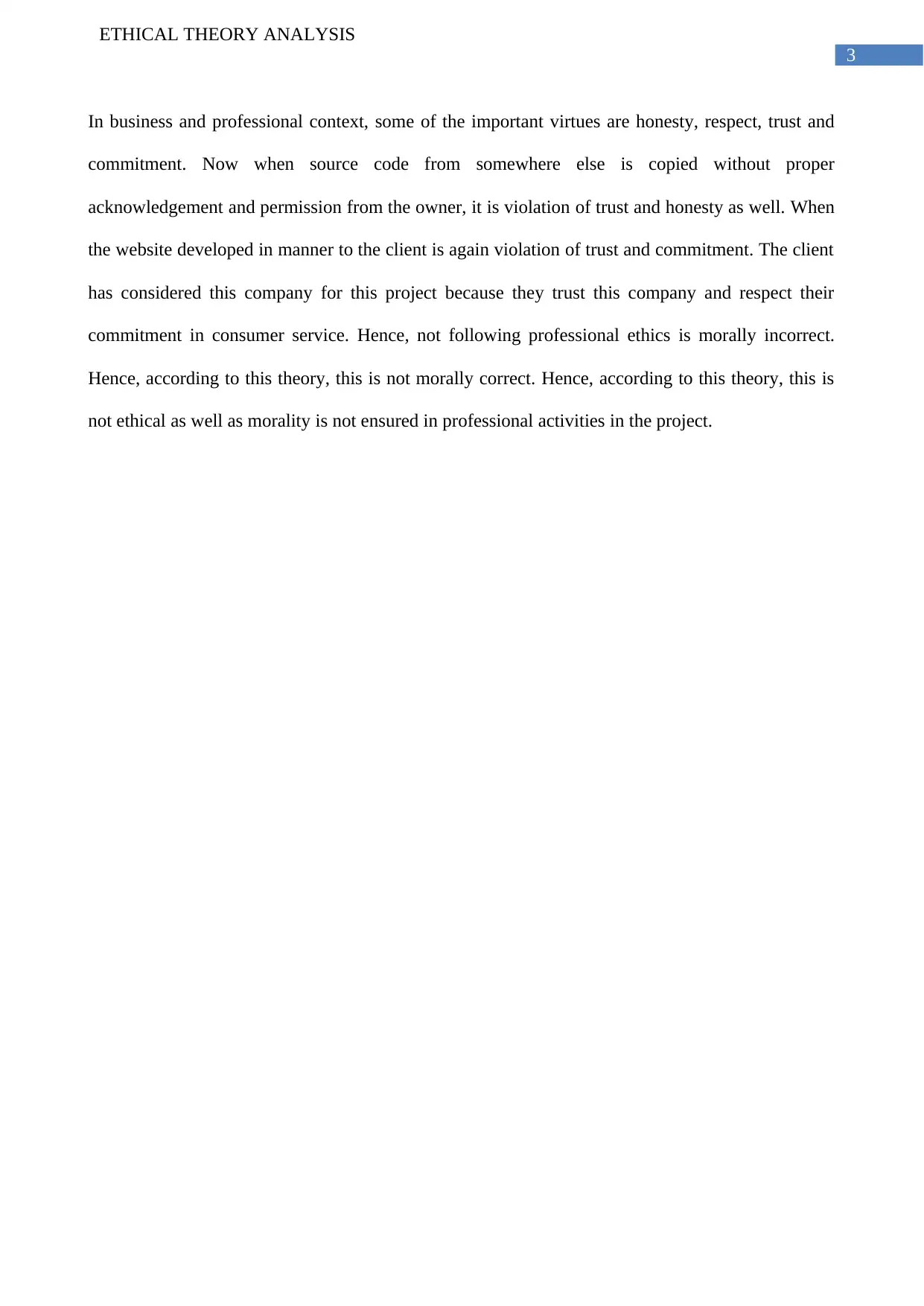
3
ETHICAL THEORY ANALYSIS
In business and professional context, some of the important virtues are honesty, respect, trust and
commitment. Now when source code from somewhere else is copied without proper
acknowledgement and permission from the owner, it is violation of trust and honesty as well. When
the website developed in manner to the client is again violation of trust and commitment. The client
has considered this company for this project because they trust this company and respect their
commitment in consumer service. Hence, not following professional ethics is morally incorrect.
Hence, according to this theory, this is not morally correct. Hence, according to this theory, this is
not ethical as well as morality is not ensured in professional activities in the project.
ETHICAL THEORY ANALYSIS
In business and professional context, some of the important virtues are honesty, respect, trust and
commitment. Now when source code from somewhere else is copied without proper
acknowledgement and permission from the owner, it is violation of trust and honesty as well. When
the website developed in manner to the client is again violation of trust and commitment. The client
has considered this company for this project because they trust this company and respect their
commitment in consumer service. Hence, not following professional ethics is morally incorrect.
Hence, according to this theory, this is not morally correct. Hence, according to this theory, this is
not ethical as well as morality is not ensured in professional activities in the project.
Paraphrase This Document
Need a fresh take? Get an instant paraphrase of this document with our AI Paraphraser
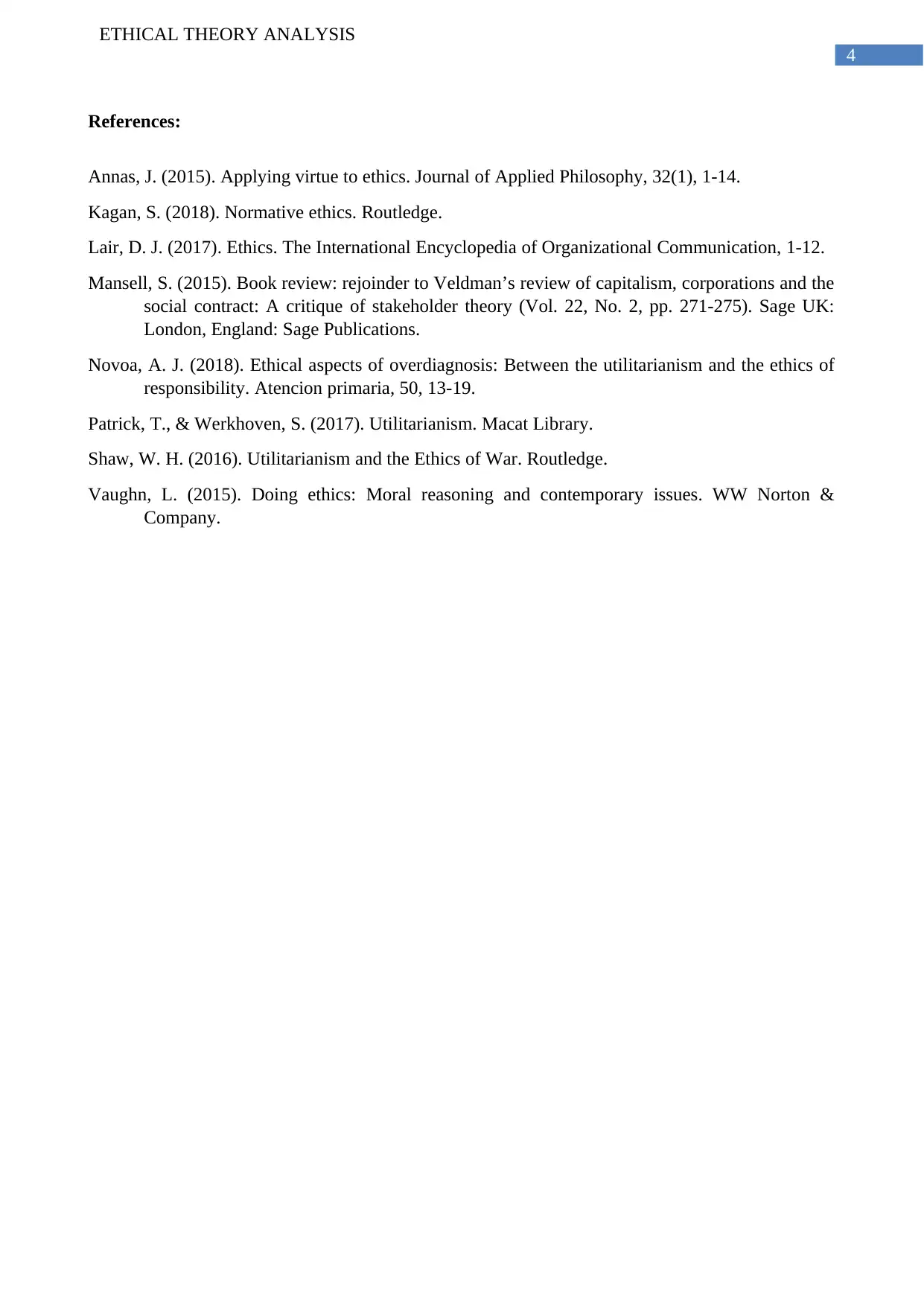
4
ETHICAL THEORY ANALYSIS
References:
Annas, J. (2015). Applying virtue to ethics. Journal of Applied Philosophy, 32(1), 1-14.
Kagan, S. (2018). Normative ethics. Routledge.
Lair, D. J. (2017). Ethics. The International Encyclopedia of Organizational Communication, 1-12.
Mansell, S. (2015). Book review: rejoinder to Veldman’s review of capitalism, corporations and the
social contract: A critique of stakeholder theory (Vol. 22, No. 2, pp. 271-275). Sage UK:
London, England: Sage Publications.
Novoa, A. J. (2018). Ethical aspects of overdiagnosis: Between the utilitarianism and the ethics of
responsibility. Atencion primaria, 50, 13-19.
Patrick, T., & Werkhoven, S. (2017). Utilitarianism. Macat Library.
Shaw, W. H. (2016). Utilitarianism and the Ethics of War. Routledge.
Vaughn, L. (2015). Doing ethics: Moral reasoning and contemporary issues. WW Norton &
Company.
ETHICAL THEORY ANALYSIS
References:
Annas, J. (2015). Applying virtue to ethics. Journal of Applied Philosophy, 32(1), 1-14.
Kagan, S. (2018). Normative ethics. Routledge.
Lair, D. J. (2017). Ethics. The International Encyclopedia of Organizational Communication, 1-12.
Mansell, S. (2015). Book review: rejoinder to Veldman’s review of capitalism, corporations and the
social contract: A critique of stakeholder theory (Vol. 22, No. 2, pp. 271-275). Sage UK:
London, England: Sage Publications.
Novoa, A. J. (2018). Ethical aspects of overdiagnosis: Between the utilitarianism and the ethics of
responsibility. Atencion primaria, 50, 13-19.
Patrick, T., & Werkhoven, S. (2017). Utilitarianism. Macat Library.
Shaw, W. H. (2016). Utilitarianism and the Ethics of War. Routledge.
Vaughn, L. (2015). Doing ethics: Moral reasoning and contemporary issues. WW Norton &
Company.
1 out of 5
Related Documents
Your All-in-One AI-Powered Toolkit for Academic Success.
+13062052269
info@desklib.com
Available 24*7 on WhatsApp / Email
![[object Object]](/_next/static/media/star-bottom.7253800d.svg)
Unlock your academic potential
Copyright © 2020–2026 A2Z Services. All Rights Reserved. Developed and managed by ZUCOL.





